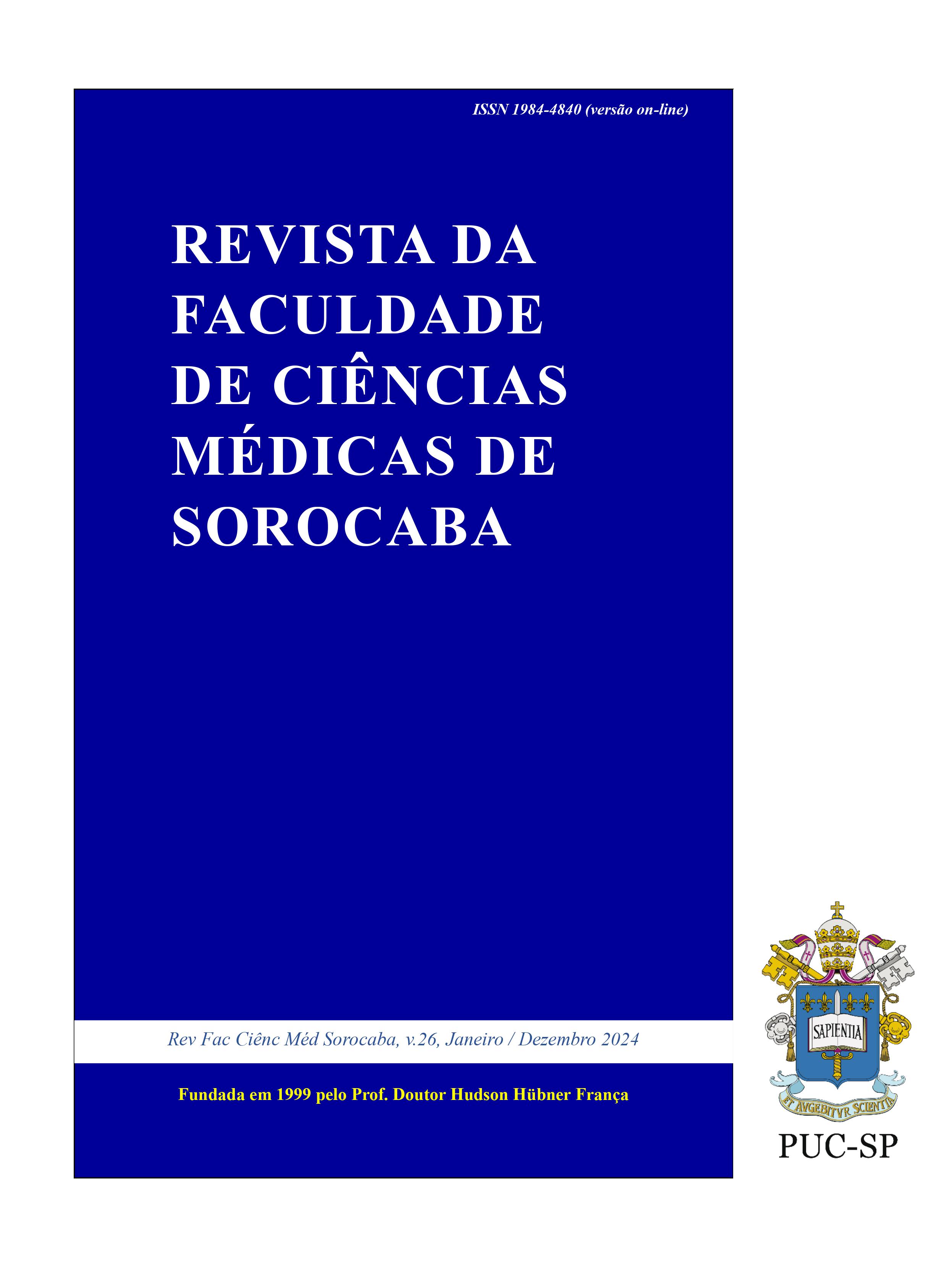Women´s knowledge about HPV and its relationship with cervical cancer
DOI:
https://doi.org/10.23925/1984-4840.2024v26a3Keywords:
Pap Test, Women's Health, Cervical Cancer, Preventive Medicine, HPV, DNA Test for HPV, Recombinant Quadrivalent Vaccine against HPV 6, 11, 16, 18Abstract
Introduction: Main preventive measures for early detection of cervical cancer; Papanicolau test (detects early tumor lesions), and vaccine against Human Papillomavirus (HPV). Objective: Considering this, the objective of the study was to analyze the association between women's knowledge about HPV and cervical cancer. Material and method: Cross-sectional study carried out on women over 18 years of age in the community of Viradouro, Niterói, (RJ), Brazil, (10/2021 to 5/2022). Two questionnaires were used with objective questions about demographic data, knowledge about the existence of the Pap test, HPV, DNA for HPV and HPV vaccine. Prevalences, means and medians were calculated. Results: 191 participants with a median age of 40 (range 18 to 84 years). Everyone knows or has heard about the Pap smear test. Among the reasons reported for not taking the test were: shame in 186 (97.4%), fear 152 (79.6%), lack of time 102 (53.4%), being in good health 98 (51.3%). 151 (79.1%) heard about HPV, 14 (7.3%) heard about DNA testing for HPV and 8 (3.3%) about quadrivalent recombinant HPV vaccine. Conclusion: The association between HPV and cervical cancer was known to more than 80% of the sample studied, but there was little knowledge about DNA testing for HPV and the quadrivalent recombinant vaccine against HPV 6, 11, 16, 18.
References
INCA. Instituto Nacional de Câncer José Alencar Gomes da Silva. Detecção precoce [Internet]. Rio de Janeiro: INCA; 2020 [acesso em: 21 nov. 2022]. Disponível em https://www.gov.br/inca/pt-br/assuntos/cancer/tipos/colo-do-utero.
Feitoza D, Jucá G, Mateus N, Frota R, Brito, T, Eleutério JRJ. Epidemiologia do câncer de colo uterino no mundo e no Brasil. Fortaleza: Universidade Federal do Ceará; 2019. doi:10.13140/RG.2.2.19978.00967.
INCA. Instituto Nacional de Câncer José Alencar Gomes da Silva. Estimativa 2020: incidência de câncer no Brasil. Rio de Janeiro: INCA; 2019.
Galvão AM, Costa CSA, Gomes MJ, Noné AR. Literácia sobre o papiloma vírus humano (HPV) e cancro do colo do útero (CCU): estudo exploratório em estudantes da área da saúde do ensino superior. In: Actas do 3º Congresso da Ordem dos Psicólogos Portugueses. Lisboa: Ordem dos Psicólogos Portugueses; 2017. p. 5-16.
Santos JA, Canno VAC. Conhecimento de mulheres universitárias em relação à importância do exame citopatológico de papanicolaou [monografia]. Lins: Centro Universitário Católico Salesiano Auxilium; 2014.
Brasil. Ministério da Saúde. Secretaria de Vigilância em Saúde. Departamento de Doenças de Condições Crônicas e Infecções Sexualmente Transmissíveis. Protocolo Clínico e Diretrizes Terapêuticas para Atenção Integral às Pessoas com Infecções Sexualmente Transmissíveis (IST). Brasília (DF): Ministério da Saúde; 2020.
Waller J, Ostini R, Marlow LAV, McCaffery K, Zimet G. Validation of a measure of knowledge about human papillomavirus (HPV) using item response theory and classical test theory. Prev Med. 2013;56(1): 35-40. doi: 10.1016/j.ypmed.2012.10.028.
INCA. Instituto Nacional de Câncer José Alencar Gomes da Silva. Fatores de risco [Internet]. Rio de Janeiro: INCA; 2022 [acesso em: 21 nov. 2022]. Disponível em: https://www.gov.br/inca/pt-br/assuntos/cancer/tipos/colo-do-utero.
Soares FGS, Oliveira JS, Souza CRS. Avaliação do conhecimento de mulheres acerca do exame preventivo do câncer do colo de útero: revisão de literatura. Anais do 13º Congresso Internacional da Rede Unida. Rev Saúde Redes. 2018;4 supl 1: 3381. doi: 10.18310/2446-48132018.
Alencar MLS, Mendes AN, Carvalho MTS. Dificuldades enfrentadas para realização do exame ginecológico preventivo. Braz J Surg Clin Res. 2019;26(1)75-9.
Abreu MNS, Soares AD, Ramos DAO, Soares FV, Nunes Filho G, Valadão F, et al. Conhecimento e percepção sobre o HPV na população com mais de 18 anos da cidade de Ipatinga, MG, Brasil. Ciênc Saúde Coletiva. 2018;23(3):849-60. doi: 10.1590/1413-81232018233.00102016.
Moura LL, Codeço CT, Luz PM. Cobertura da vacina papilomavírus humano (HPV) no Brasil: heterogeneidade espacial e entre coortes etárias. Rev Bras Epidemiol. 2021;24: e210001. doi: 10.1590/1980-549720210001.
Pinheiros SL, Aguiar JMRP, Brianez N, Nascimennto TC, Politano GT, Silva SREP. Hiperplasia epitelial papilomatosa em crianças. Rev Ciênc Med. 2009;18(5):281-6.
Brandt HRC, Fernandes JD, Patriota RCR, Criado PR, Belda Junior W. Tratamento do papiloma vírus humano na infância com creme de imiquimode a 5%. An Bras Dermatol. 2010;85(4):549–53. doi: 10.1590/S0365-05962010000400020.
Downloads
Published
How to Cite
License
Copyright (c) 2024 Revista da Faculdade de Ciências Médicas de Sorocaba

This work is licensed under a Creative Commons Attribution-NonCommercial 4.0 International License.
Os autores no momento da submissão transferem os direitos autorais, assim, os manuscritos publicados passam a ser propriedade da revista.
O conteúdo do periódico está licenciado sob uma Licença Creative Commons 4.0, esta licença permite o livre acesso imediato ao trabalho e que qualquer usuário leia, baixe, copie, distribua, imprima, pesquise ou vincule aos textos completos dos artigos, rastreando-os para indexação, passá-los como dados para o software, ou usá-los para qualquer outra finalidade legal.

 Este obra está licenciada com uma Licença
Este obra está licenciada com uma Licença 